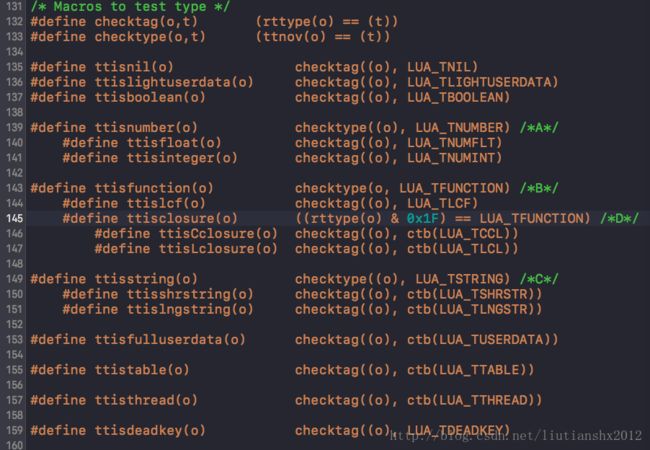Lua 5.3 源码分析(二)值 TValue
Lua 5.3 源码分析(二)值 TValue
抽象数据类型(Abstract Data Type)ADT
union Value {
GCObject *gc; /* collectable objects */
void *p; /* light userdata */
int b; /* booleans */
lua_CFunction f; /* light C functions */
lua_Integer i; /* integer numbers */
lua_Number n; /* float numbers */
};
struct lua_TValue {
TValuefields;
};
#define TValuefields Value value_; int tt_
typedef struct lua_TValue TValue;
typedef TValue *StkId; /* index to stack elements */
其中0-3 bit 表示基本类型; 4-5 bit 表示子类型;第 6 bit 表示是否可GC。这样就可以完整的标记所有的 Lua 类型 。
GET TYPE
这组宏来判断TValue 的具体类型
/* raw type tag of a TValue */
#define rttype(o) ((o)->tt_)
/* tag with no variants (bits 0-3) */
#define novariant(x) ((x) & 0x0F)
/* type tag of a TValue (bits 0-3 for tags + variant bits 4-5) */
#define ttype(o) (rttype(o) & 0x3F)
/* type tag of a TValue with no variants (bits 0-3) */
#define ttnov(o) (novariant(rttype(o)))
A、B、C 三个地方使用 checktype 宏判断大类型 。(判断 0 - 3 bit 即可)
D 处使用 ( rttype(o) & 0001 1111 )来判断小类型。(判断 4 - 5 bit 即可)
其余地方都使用 cbt 宏来判断可垃圾回收类型。(判断 0 - 6 bit 即可)
比如怎么判断一个 LUA_TNUMBER 是 LUA_TNUMFLT 还是 LUA_TNUMINT
define LUA_TNUMFLT (LUA_TNUMBER | (0 << 4)) /*0000 0011 = 0x3 = 3 */
define LUA_TNUMINT (LUA_TNUMBER | (1 << 4)) /* 0001 0011 = 0x13 = 19*/
/* Variant tags for functions */
define LUA_TLCL (LUA_TFUNCTION | (0 << 4)) /* (0110 | 0000 = 0x6 = 6)Lua closure */
define LUA_TLCF (LUA_TFUNCTION | (1 << 4)) /* (0110 | 0001 0000 = 0x16 = 22)light C function */
define LUA_TCCL (LUA_TFUNCTION | (2 << 4)) /* (0110 | 0010 0000 = 0x26 = 38)C closure */
/* Bit mark for collectable types */
#define BIT_ISCOLLECTABLE (1 << 6)
/* mark a tag as collectable */
#define ctb(t) ((t) | BIT_ISCOLLECTABLE)
#define righttt(obj) (ttype(obj) == gcvalue(obj)->tt)
针对 GCObject , Lua提供一个判断 TValue 里的 tag type 和GCObject里的tag type是否一致的判断。
GET VALUE
/* Macros to access values */
#define ivalue(o) check_exp(ttisinteger(o), val_(o).i)
#define fltvalue(o) check_exp(ttisfloat(o), val_(o).n)
#define nvalue(o) check_exp(ttisnumber(o), \
(ttisinteger(o) ? cast_num(ivalue(o)) : fltvalue(o)))
#define gcvalue(o) check_exp(iscollectable(o), val_(o).gc)
#define pvalue(o) check_exp(ttislightuserdata(o), val_(o).p)
#define tsvalue(o) check_exp(ttisstring(o), gco2ts(val_(o).gc))
#define uvalue(o) check_exp(ttisfulluserdata(o), gco2u(val_(o).gc))
#define clvalue(o) check_exp(ttisclosure(o), gco2cl(val_(o).gc))
#define clLvalue(o) check_exp(ttisLclosure(o), gco2lcl(val_(o).gc))
#define clCvalue(o) check_exp(ttisCclosure(o), gco2ccl(val_(o).gc))
#define fvalue(o) check_exp(ttislcf(o), val_(o).f)
#define hvalue(o) check_exp(ttistable(o), gco2t(val_(o).gc))
#define bvalue(o) check_exp(ttisboolean(o), val_(o).b)
#define thvalue(o) check_exp(ttisthread(o), gco2th(val_(o).gc))
/* a dead value may get the 'gc' field, but cannot access its contents */
#define deadvalue(o) check_exp(ttisdeadkey(o), cast(void *, val_(o).gc))
#define l_isfalse(o) (ttisnil(o) || (ttisboolean(o) && bvalue(o) == 0))
#define iscollectable(o) (rttype(o) & BIT_ISCOLLECTABLE)
这组宏 实现了带类型校验的值获取操作, 对于需要GC的类型 利用 下面一组宏,将GCObject 转换后对应的 TString 、TUSERDATA、TFUNCTION、TTABLE、TPROTO、TTHREAD 数据类型。
/*
** Union of all collectable objects (only for conversions)
*/
union GCUnion {
GCObject gc; /* common header */
struct TString ts;
struct Udata u;
union Closure cl;
struct Table h;
struct Proto p;
struct lua_State th; /* thread */
};
#define cast_u(o) cast(union GCUnion *, (o))
/* macros to convert a GCObject into a specific value */
#define gco2ts(o) \
check_exp(novariant((o)->tt) == LUA_TSTRING, &((cast_u(o))->ts))
#define gco2u(o) check_exp((o)->tt == LUA_TUSERDATA, &((cast_u(o))->u))
#define gco2lcl(o) check_exp((o)->tt == LUA_TLCL, &((cast_u(o))->cl.l))
#define gco2ccl(o) check_exp((o)->tt == LUA_TCCL, &((cast_u(o))->cl.c))
#define gco2cl(o) \
check_exp(novariant((o)->tt) == LUA_TFUNCTION, &((cast_u(o))->cl))
#define gco2t(o) check_exp((o)->tt == LUA_TTABLE, &((cast_u(o))->h))
#define gco2p(o) check_exp((o)->tt == LUA_TPROTO, &((cast_u(o))->p))
#define gco2th(o) check_exp((o)->tt == LUA_TTHREAD, &((cast_u(o))->th))
/* macro to convert a Lua object into a GCObject */
#define obj2gco(v) \
check_exp(novariant((v)->tt) < LUA_TDEADKEY, (&(cast_u(v)->gc)))
/* actual number of total bytes allocated */
#define gettotalbytes(g) ((g)->totalbytes + (g)->GCdebt)
所有的GCObject都有共同的头部,也就是CommonHeader,所以可以把GCObject转为GCUnion之后,再转为具体类型的指针,安全性由check-exp保证。 反之, obj2gco 这个宏 又提供 将具体TString 、TUSERDATA、TFUNCTION、TTABLE、TPROTO、TTHREAD 数据类型转换为 GCObject 的操作
SET VALUE
设置TValue 的值,需要同时设置 Value 和 TAG TYPE。这组宏里面,对GCObject,都要通过obj2gco把具体类型转型后再赋值给val_(io).gc字段。
/* Macros to set values */
#define settt_(o,t) ((o)->tt_=(t))
#define setfltvalue(obj,x) \
{ TValue *io=(obj); val_(io).n=(x); settt_(io, LUA_TNUMFLT); }
#define setivalue(obj,x) \
{ TValue *io=(obj); val_(io).i=(x); settt_(io, LUA_TNUMINT); }
#define setnilvalue(obj) settt_(obj, LUA_TNIL)
#define setfvalue(obj,x) \
{ TValue *io=(obj); val_(io).f=(x); settt_(io, LUA_TLCF); }
#define setpvalue(obj,x) \
{ TValue *io=(obj); val_(io).p=(x); settt_(io, LUA_TLIGHTUSERDATA); }
#define setbvalue(obj,x) \
{ TValue *io=(obj); val_(io).b=(x); settt_(io, LUA_TBOOLEAN); }
#define setgcovalue(L,obj,x) \
{ TValue *io = (obj); GCObject *i_g=(x); \
val_(io).gc = i_g; settt_(io, ctb(i_g->tt)); }
#define setsvalue(L,obj,x) \
{ TValue *io = (obj); TString *x_ = (x); \
val_(io).gc = obj2gco(x_); settt_(io, ctb(x_->tt)); \
checkliveness(G(L),io); }
#define setuvalue(L,obj,x) \
{ TValue *io = (obj); Udata *x_ = (x); \
val_(io).gc = obj2gco(x_); settt_(io, ctb(LUA_TUSERDATA)); \
checkliveness(G(L),io); }
#define setthvalue(L,obj,x) \
{ TValue *io = (obj); lua_State *x_ = (x); \
val_(io).gc = obj2gco(x_); settt_(io, ctb(LUA_TTHREAD)); \
checkliveness(G(L),io); }
#define setclLvalue(L,obj,x) \
{ TValue *io = (obj); LClosure *x_ = (x); \
val_(io).gc = obj2gco(x_); settt_(io, ctb(LUA_TLCL)); \
checkliveness(G(L),io); }
#define setclCvalue(L,obj,x) \
{ TValue *io = (obj); CClosure *x_ = (x); \
val_(io).gc = obj2gco(x_); settt_(io, ctb(LUA_TCCL)); \
checkliveness(G(L),io); }
#define sethvalue(L,obj,x) \
{ TValue *io = (obj); Table *x_ = (x); \
val_(io).gc = obj2gco(x_); settt_(io, ctb(LUA_TTABLE)); \
checkliveness(G(L),io); }
#define setdeadvalue(obj) settt_(obj, LUA_TDEADKEY)
#define setobj(L,obj1,obj2) \
{ TValue *io1=(obj1); *io1 = *(obj2); \
(void)L; checkliveness(G(L),io1); }
/*
** different types of assignments, according to destination
*/
/* from stack to (same) stack */
#define setobjs2s setobj
/* to stack (not from same stack) */
#define setobj2s setobj
#define setsvalue2s setsvalue
#define sethvalue2s sethvalue
#define setptvalue2s setptvalue
/* from table to same table */
#define setobjt2t setobj
/* to table */
#define setobj2t setobj
/* to new object */
#define setobj2n setobj
#define setsvalue2n setsvalue
